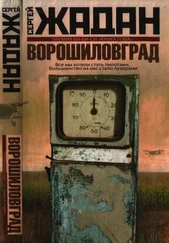“We are doing everything we can. We would like things to go well for you, but how they go is not entirely up to us, so you shouldn’t rely on us alone. Most of our woes and crises of faith stem from our own unwillingness to separate our actions into two categories—good ones and bad ones. We have our love, but we don’t always use it. We have our fear, and we rely on it more than we ought to. There are two paths in life—one leads to heaven and the other to hell. Those paths often cross, though.”
They set up their furniture-repair shop in the basement of the local utilities department. There was no sign, but the people who needed to find it could—turn after the metro, pick out the right building, duck into the brick archway, and you’ll see the black metal door in the wall. Just knock or ring the bell. They’d stuck a sagging couch down there for the employees to nap on if they didn’t have any work to do. Stationary equipment loomed in the middle of the room, and tables cluttered with jars, brushes, dry rags, pencils, worn-down sandpaper, and dull foldable knives with bent blades crowded up against the walls. A heavy, swaying lamp dangled from the ceiling and yellowed Soviet factory posters and a few wrestling plaques hung on the walls. The shop smelled of paint, varnish, old wood, and other people’s homes, where all those chairs, wardrobes, bureaus, and bookcases had been before customers lugged them down here to get fixed or restored.
In the mornings, they’d open the windows, which faced an apartment complex overrun with grass and wild garlic. Fresh air and the muffled sounds of the streets would fill the room. There were some gnarled apple trees out there, and the furniture guys put a couple of benches in their shade—another place for naps. There were some wobbly little structures built against the sides of the apartment blocks a little farther away, beyond the trees, but it was no easy task fighting through the twisting ivy and tall grass to get to them. Even farther back towered a jagged section of brick wall—all that remained of the buildings that had once stood there, now ruined and forgotten. The wall ran up against a wide street that stretched uphill, past the Polytechnic Institute, toward the center of town. In the summer, the block would be completely empty, and the grassy spaces enclosed by the apartment buildings would be as quiet as churches on Monday. There’d be even less work, leaving the employees with nothing better to do than listen to the radio on their cellphones.
Mark started working here back in the winter. In March, the shop was damp; he and his partner in crime would sit there, drinking their boxed wine, pairing it with scoops of the hard, dark snow that would linger on the ground under their windows until mid-April. His partner in crime, Yasha, had been at the shop since the beginning. He’d known the boss since the eighties—they were working at the bike factory, just going with the flow, then the nineties hit, they tried to start charting their own course, and the boss capsized. Loyal to a fault, Yasha waited for him faithfully, like a sailor’s wife at the harbor. About ten years back, at the beginning of the 2000s, the boss got the green light to set up shop in the basement—he had to pull a lot of strings to make it happen, too. He’d find all his customers himself, buy all the used stuff himself, drop off salvaged material at night, stop by with some shady customers in the morning, casually raise the price on bureaus, make some calls, avoid some people in town, hardly socialize with anyone—hardly anyone liked him—but his heart wasn’t really in it. Yasha, who had nimble fingers and a resilient liver, was the one who really kept the place running. But Yasha wasn’t getting any younger, so he asked for an assistant. The boss wouldn’t go for any outside help. After all, he barely trusted the guys he had. But then Kolia, one of Yasha’s good buddies, recommended his nephew Mark.
“It’s better to hire people you know. At least they won’t unionize on ya.”
So the boss went with Mark, and afterward he’d often say he’d done a good deed, but he later expressed remorse for his actions.
“Mark,” the boss told his newly minted apprentice, “you have to honor your parents, even if you don’t have any.” Mark grew up without his father, who had gone up north with a lumber company and never come back, so his mother raised him. She did the best she could, which was pretty terrible. His uncle Kolia would step in at the most crucial moments—he bribed the draft board to get his nephew off the hook, got the college admissions committee to give him a slot in night school, and found odd jobs for him. But he kept his distance, never quite letting his guard down. Mark realized that, so now, at the ripe old age of thirty, he only trusted providence… though providence hadn’t done much to earn his trust.
The job wasn’t very interesting, but on the plus side it wasn’t too demanding for the new apprentice—Mark hauled some furniture around, polished some things, and sanded some boards. Whenever the boss headed out to run errands, Yasha would go pick up some wine and Mark would sprawl out on the couch and flip through old newspapers, clearly dumbstruck by the kind of headlines he found there. The liquor store was across from the shop, built right into the factory’s entry hall. Everybody knew Yasha there and nobody liked him. Yasha had the gentle touch of a true mentor, treating his student well; he even made all the alcohol runs himself. After a few drinks, the master would start talking about his life, and the apprentice would listen inattentively, not giving much credence to what he heard. According to Yasha, there were no women in the world he hadn’t slept with, and no men he hadn’t shared drinks with. Mark would show up to work in varnish-stained Keds, baggy white jeans with bright chemical speckles, and T-shirts his mom had scored at some Swiss charity event. He was calm, amiable, and a bit reserved; his heart wasn’t really in it, and he would’ve quit months ago, if it hadn’t been for Kolia. He was afraid of Kolia, whose imposing apathy had a debilitating effect on him. Otherwise, Mark was doing pretty well—he didn’t have any friends and he lived with his mom, though they hardly talked because his mom didn’t have any new stories and he didn’t feel like hearing the old ones again. He enjoyed napping in the afternoon and he’d have some pretty exotic and menacing dreams during his siestas—snakes with women’s heads and foxes with the voices of opera singers, buildings on fire, and rivers with dragons flying over them. He’d wake up in the late afternoon and climb out through the window to sit on a bench outside. Stray dogs would encircle him, ready to pounce, but they lacked the gusto to go for it—after all, what could you take from this odd character who smelled like varnish and wood? What could he have in his pockets besides nails, string, metal plumb bobs like machine-gun cartridges, and drawing compasses? Sometimes Mark would spend the night at work, switching on the table lamps, and bugs would be drawn into the room, only to be scorched by the bulbs and plummet to the floor. Mark roamed around the room, and the bugs crunched cheerfully under his feet like peanut shells.
He’d been up all night; he wanted to prolong that state that follows an extended stretch of sleeplessness, that feeling of being detached from the motion of the planets through the heavens. Thirty is the right age for learning to enjoy the passage of time and stop regretting that it passes so quickly. His habits had long since become fixed, his anxiety had dissipated, and he had comfortably settled into his addictions. The need to fight off drowsiness and preserve the eerie and fleeting quality of the world’s darkness within himself hit Mark hardest in the summer months. At around 6 a.m., he’d completely lose the ability to orient himself in time; the sun was already over the trees, but the moon was still hanging up in the sky—it seemed as though the city had woken up a while ago and everyone was attending to important business, which gave Mark an unaccountable feeling of anxiety or anticipation, like the planets had perfectly aligned above him, hinting at the beginning of something important in his life, the kind of thing that ought to begin on one of these strange days at the end of June, when suns and moons multiply and hide in the air like foxes in warm grass. He shut the windows, walked outside, and took out his phone to check the time. At that very moment he got a call from Kolia.
Читать дальше










